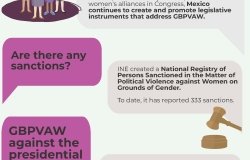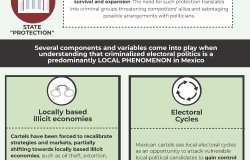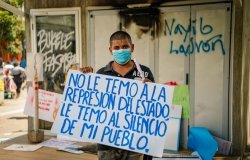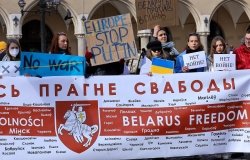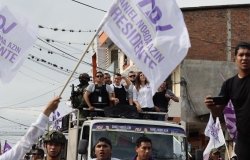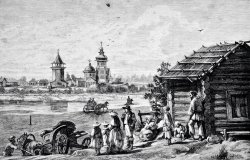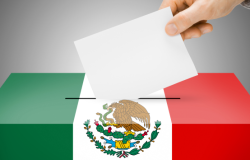Egypt: Interview with Mohamed Morsi
In an interview with CNN, Egyptian President Mohamed Morsi called for Syrian President Bashar Assad to be tried for war crimes at the International Criminal Court. Morsi also pledged to respect Egypt’s treaty with Israel while supporting Palestinian efforts to attain “their full-fledged rights.” He outlined his new attempt to reconcile Hamas and Fatah, the two dominant Palestinian parties that have split up the West Bank and Gaza since factional fighting in 2007.
In an interview with CNN, Egyptian President Mohamed Morsi called for Syrian President Bashar Assad to be tried for war crimes at the International Criminal Court. Morsi also pledged to respect Egypt’s treaty with Israel while supporting Palestinian efforts to attain “their full-fledged rights.” He outlined his new attempt to reconcile Hamas and Fatah, the two dominant Palestinian parties that have split up the West Bank and Gaza since factional fighting in 2007.
Morsi, who rose from obscurity to the most powerful Arab political position in the first free presidential election last June, also vowed to maintain strong U.S. ties. “The most important thing for me is to have a real friendship between Egyptians and Americans,” Morsi told CNN’s Wolf Blitzer. Morsi said that he expects to visit the United States. But in what is likely to spark controversy, he also said he will press President Obama to free Omar Abdel Rahman, the so-called Blind Sheikh who is serving a life sentence for connections to the 1993 World Trade Center bombing.
Morsi claimed that he intends to honor basic freedoms, including allowing political opponents to say “what they want” without fear of going to prison. “I think our grandchildren will take it [freedom] for granted,” Morsi told CNN. He also claimed that Egyptian Christians have the same rights as Muslims, despite growing concerns among Christians since the Muslim Brotherhood candidate was elected president. The following are excerpts from Morsi’s interview with Blitzer.
Freedom of Expression
BLITZER: I hear that some prominent Egyptians are being investigated for treason that raises concern about democracy. What's going on that people like this are being investigated for treason?
MORSI: Democracy in Egypt and freedom are abided by and opposition in Egypt is respected and appreciated, for those to express their opinions and their points of view in Egypt now and in Egypt's future and to be a true partner in opinion and vision, effective criticism and constructive criticism. All of this is a right guaranteed for opposition in Egypt. There are some challenges, there are some acts that don't comply with the law that is addressed in the judicial system and the law and the President of the Republic. It is not my right to interfere in what the procedures of the courts and what gets applied to and applied by the law.
BLITZER: And they can criticize you without fear of going to jail?
MORSI: This happens every day. Anyone can say from the opposition whatever they want for the sake of the interests of the nation and no one should be afraid of the opposition.
BLITZER: That is very encouraging, to hear that from you, the president of Egypt. And as a journalist, I want freedom of the press. You want freedom of the press. And there is a case, though, of a satirist, a popular satirist, Osam Yusef, who's also being investigated for supposedly ridiculing you and the government. What's going on with Osam Yusef?
MORSI: Whoever criticizes me has the full right to do so, if there are some legal measures and some of the Egyptians file complaints in this respect, this is the issue that gets handled within the judicial system and the courts- not to me.
This is a full-fledged system. And therefore, I welcome any criticism, I welcome every opinion, I welcome every view and I push everyone to work.
BLITZER: But just to tie up this issue, Osam Yusef, Amr Moussa and Mohamed ElBaradei, they don't have to worry about going to jail?
MORSI: They are Egyptians. They are part of my family, from Egypt. There is no way that any harm can befall them because of their opinions or their personal opposition. There is no possible way to talk about or discuss jails or imprisonment as an option because of political involvement, according to the law. There is no possible way to discuss this.
Syria
MORSI: The Syrian people through their revolution and through the movement will -- when the bloodshed stops -- move to a new stage where they will have an independent parliament and a government of their choosing. And then they will decide what they want to do to those who committed crimes against them. It is the Syrian people who decide…
It is not I who want this [Assad to be tried before the International Criminal Court for war crimes], but the Syrian people who want this… This phase is the phase of the people. Similar to what the Egyptian people wanted, the Syrian people want it. And we support the Syrian people, and they're going to win, and they have the will to win.
Religious Minorities
MORSI: There is no objection in Islam to democracy. We move as Egyptians, Muslims and Christians, rich and poor, all Egyptians to new heights of democracy. There will be no going backwards, not to the previous period or to dictatorship at all.
And this is what I abide by and I insist upon. And we gain everyday new heights in the context of applying and practicing democracy with complete freedom for all Egyptians.
BLITZER: But you know there are a lot of Egyptians, Christians, Copts, who are very frightened right now and worried that their country, Egypt, country where they lived forever, is moving in the wrong direction.
MORSI: Those people are my beloveds. And the children of the nation, the Christians and their brothers, the Muslims. There is no room to worry at all and the rights of all Egyptians in this nation are equal. The same rights for everyone. And they have the same obligations. The children of Egypt can't be divided at all because of their beliefs, practices or their worship. We are all Egyptians.
BLITZER: What is your message to them about the religious freedom of Copts, of Christian Copts in Egypt?
MORSI: The freedom of belief and the freedom of practicing rituals of worship, for Christians and Muslims, everyone who has a belief. For the first time in history, there is a special portion in the constitution for Christians and Jewish Egyptians and their right to return to and resort to their private matters based on their rituals and prescribe to their believes and religion.
A Visit to the United States
MORSI: God willing, I will plan for this trip. There is no set date yet, but it will most likely be before the end of the first quarter of this year.
President Obama is an elected president by the American people and he grants the will of the American people by working for the interests of the American people. And this is the American people's right in their president.
I respect him and I value him. He played an effective and important role in the cease-fire in regards to Gaza and the end of attacks against Gaza. He cooperated with us in a big way and I'm still in constant communication with him. When we meet, there will be a chance to talk about cooperation in different areas, like scientific research, manufacturing and production, investments and tourism.
BLITZER: So you plan on coming to the United States, god willing, inshallah, as we say, in the first quarter of this year, between now and the end of March?
MORSI: Before the end of the first quarter, God willing, I will visit, as you said I will visit, the United States of America. And I will be happy with this visit….
The most important thing for me is to have real friendship between Egyptians and Americans.
BLITZER: So what does that mean?
MORSI: Yes, what that means is mutual balance with the relationships, mutual benefits. Now, I need the technology transferred. I need scientific research. I need expertise in different directions to help. I have resources. Now, experience with the United States, as far as planning, as far as implementing, as far as producing in different directions, real production. So there is -- a lot of things that I want to transfer from the United States to Egypt.
The Economyand Foreign Investment
MORSI: I’m talking about enrichments along the Suez Canal. We have almost 200 kilometers or something between Suez and Port Said, and this can be an area where you can invest, investors from outside and from the Egyptians also, can make real production area. Industry. We – I want to have this area as a real advanced, developed area along the Suez Canal.
BLITZER: So you’re looking for foreign investment.
MORSI: Yes, from the U.S., from the others. Yes, from China, from Russia, from the Arabs, from the Egyptians outside of – from Europe. Well, you know, the real key entrance to Africa is Egypt. The logistic health to investors for Africa can start from Egypt. We have the Suez Canal, we have a seashore for (INAUDIBLE) and also the Mediterranean Sea. We have the Nile River. We can go through with the people to Africa, to Sudan, to Libya, also, to Chad.
“The Blind Sheikh” (Omar Abdel Rahman, an Egyptian serving a life sentence in the United States for connections to the 1993 World Trade Center bombing)
BLITZER: Just clarify your position on what you want the U.S. Government to do as far as the -- the blind sheikh is concerned, who's being held in prison in the United States, convicted of his involvement in the blowing up of the 1993 World Trade Center bombing incident?
MORSI: I want him to be free, but I respect the law and the rule of law in Egypt and the United States. What I am talking about isn't a violation. I don't want a violation of the rule of law, but there are also many humane aspects. There could be things like visitation, assistance, his children, his family, assisting him. He is an old sheikh and sick and blind.
We need to respect that in this sheikh. Is there a chance for him to be freed?
I wish this, but considering my respect and appreciation for the American rule of law and the American government, our relationship, Egypt's relationship with America deserves that these issues be reviewed, if that is OK according to the law.
If it isn't possible -- and I hope that it is possible -- if it wasn't possible, then these humane aspects need to be taken into account for him to be in a humane prison, to be able to have visitors, to be able to have company, to be able to visit with his sons and children, for his family to visit, for us to see him, for people to see him and know how he is doing, because he is a man, an old man, and he deserves full care. I wish that there could be a big possibility for the American administration to look into this matter about this sheikh, who is very old, without there being, I don't intend on violating the rule of law in any place. And I don't like anyone asking me to violate the rule of law in my own country.
But the humane aspects, at the very least, need to be guaranteed.
BLITZER: Will you make this appeal directly to President Obama when you see him?
MORSI: When I meet with him, I will talk to him about this issue.
The Arab Spring
MORSI: Well, I would say to start real stability and development, there are steps. We may take six months or a year. To reach what we want, I think we may take five or ten years to reach 60, 70 percent of what we want… The victory of the Arab Spring and the respect of people's will. This world should realize that the will of people will win over and will prevail. So let's cooperate for the sake of stability and not interfere in the affairs of Egypt and not one would hegemonize the other. Peace for all. Stability, freedom for all within their nation.
The Arab Spring will win over. And this area shall civilize. But of course, we can't work in isolation from the world. We love this world and we want to live in peace. We'll work on that. And the will of people from the region shall prevail and win over in the near future, inshallah…
I think our grandchildren will take it [freedom] for granted. But we have been suffering together, and then we are moving together to the new position, real freedom, democracy. Good welfare.
Israeli-Palestinian Conflict
BLITZER: Do you believe in a two-state solution that will allow Israel and Palestine to live side by side?
MORSI: The Palestinians have the full right, without any interference from anyone to decide whatever they want for themselves. And now, I'm working on a substantial and much needed reconciliation between the Palestinians, between the Palestinian factions, between Fatah and the other factions, Hamas and others, so that they can be unified in one opinion. And it's them who decides. I support them in what they decide. They have the right. They own the right. It's only them who have the right to decide their destiny themselves. And, by the way, this is stated in the peace treaty. The Palestinians decide what they want and I respect their decisions.
On Meeting with Israeli Leaders
BLITZER: In other words, if there's such a meeting between you and an Israeli leader will have to wait until there's an agreement between the Israelis and the Palestinians?
MORSI: I believe this question is not in its place now. Between us and the world, there are diplomatic relations. And everybody knows that. So I see that this is not the place for this question now. I respect the peace treaty. I am keen on respecting what Egypt has signed as a state previously, at the international level. I respect the will of the world. But this does not conflict at all with my support for the Palestinians in their full-fledged rights and that they attain them. When this happens, the Egyptians are going to express their views.
Click here to watch the interview.
Related Program

The Islamists
Learn more about Hamas and how it relates to similarly aligned organizations throughout the region. Read more
